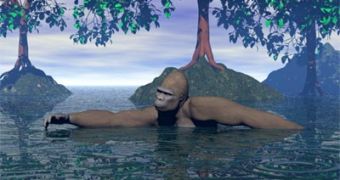Next week, the city of London is to play host to a team of scientists who are expected to meet there in order to discuss old and new arguments in favor of the so-called aquatic ape theory.
This theory says that, contrary to the popular opinion derived from scientific evidence, our ancestors used to live not on land, but in water.
Thus, humans as a self-standing species evolved from apes that emerged from water, gradually lost most of their fur and eventually started to walk upright.
The ability to walk upright was intended to make our ancestors able to keep their head out of the water, while the loss of bodily hair need be linked to their developing subcutaneous fat instead.
As Daily Mail explains, subcutaneous fat works better than fur when it comes to keeping an individual warm while in the water.
This series of transformations peaked when the former aquatic apes developed relatively large brains, all thanks to their feasting on whopping amounts of omega 3-rich seafood.
Those who support these ideas claim that several other anatomical particularities displayed by all modern humans are proof enough that the aquatic ape theory is not just gibberish, as some might wish to refer to it.
More precisely, the large sinuses that humans have only came to be this big in order to help improve buoyancy.
Interestingly enough, these aquatic apes are believed to have been the descendants of tree-living apes which for one reason or another chose to inhabit streams, rivers and seas instead.
The majority of the scientific community does not really approve of this theory, and some even poke fun at it.
Professor Chris Stringer of the Natural History Museum in London settled for pointing out the following:
“If they were all the result of our lives in watery environments, we would have to have spent millions of years there and there is no evidence for this - not to mention like crocodiles and other creatures would have made the water a very dangerous place.”

 14 DAY TRIAL //
14 DAY TRIAL //